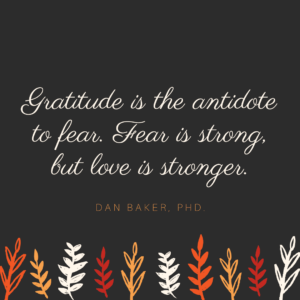 Appreciation, or gratitude is the first and most fundamental happiness tool. Gratitude is the purest, strongest form of love. It is the outward-bound kind of love that asks for nothing and gives everything. Gratitude is the antidote to fear. Fear is strong, but love is stronger – Dan Baker, PhD.
Appreciation, or gratitude is the first and most fundamental happiness tool. Gratitude is the purest, strongest form of love. It is the outward-bound kind of love that asks for nothing and gives everything. Gratitude is the antidote to fear. Fear is strong, but love is stronger – Dan Baker, PhD.
It’s definitely that time of year, and many people are thinking about everything they have to be thankful for. However, gratitude shouldn’t just be an annual November exercise, but a daily practice. More and more researchers are finding that gratitude doesn’t just make you feel like a better person, it’s actually good for your health. What’s more, gratitude is more than simply saying thanks, it’s a way of seeing the world.
“Clinical trials indicate that the practice of gratitude can have dramatic and lasting effects in a person’s life,” said Robert A. Emmons, professor of psychology at UC Davis. “It can lower blood pressure, improve immune function and facilitate more efficient sleep.”
Emmons also reports that people who keep a gratitude journal have a reduced dietary fat intake — as much as 25 percent lower. Who knew gratitude was a diet aid? Stress hormones like cortisol are 23 percent lower in grateful people. And having a daily gratitude practice could actually reduce the effects of aging to the brain. Being thankful has such a profound effect because so many positive feelings go along with it, Emmons said.
Thanksgiving is a perfect opportunity to show gratitude, according to Emmons, because the two go hand-in-hand. “The word ‘thanksgiving’ literally means, giving of thanks. Thanksgiving is an action word. Gratitude requires action.”

Gratitude can help you:
Experience fewer aches and pains. According to a 2012 study published in Personality and Individual Differences, grateful people report feeling healthier than other people. Not surprisingly, grateful people are also more likely to take care of their health and exercise more often, which is likely to further contribute to longevity.
Have better immune health. Not surprisingly, gratefulness is also linked with optimism, which in turn is linked with better immune health. For example, a University of Utah study showed that stressed-out law students who were optimistic had more immune-boosting blood cells than people who were pessimistic, according to WebMD.
Help you sleep better. Writing in a gratitude journal for 15 minutes before bed has been shown to help you worry less and sleep longer and better. Another study found that gratitude predicted better sleep quality and duration and less sleepiness during the day. Researchers explained that when falling asleep, grateful people are less likely to think negative and worrying thoughts that impair sleep and more likely to think about positive things, thereby enhancing sleep quality.
Boost your energy levels. In Emmons’s gratitude-journal studies, those who regularly wrote down things that they were thankful for consistently reported an increasing sense of vitality. Control subjects who simply kept a general diary saw little increase, if any. The reason is unclear, but improvements in physical health, also associated with giving thanks, may have something to do with it. The better your body functions, the more energetic you feel.
Keep your heart healthy. One study involved 186 men and women, who already had some damage to their heart, either through years of sustained high blood pressure or as a result of heart attack or even an infection of the heart itself. Researchers had participants fill out a questionnaire to rate how grateful they felt for the people, places or things in their lives. It turned out the more grateful people were, the healthier they were. When blood tests were then conducted to measure inflammation or plaque buildup in the arteries, researchers found lower levels among those who were grateful — an indication of better heart health.
It’s important to remember this week –– and every week –– that gratitude is a lifestyle strategy, rather than something we do casually during the holidays. Our lives are all filled with miraculous gifts to be grateful for, to savor. By taking the time to feel grateful for those gifts , we in effect honor the things that make our lives so rich and full, and improve our health along the way.

